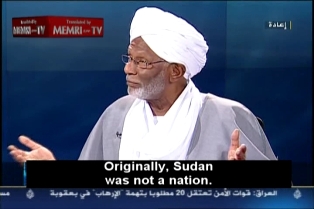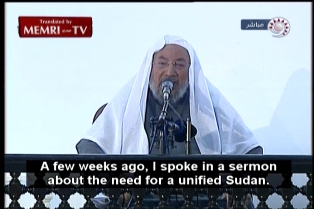 | ||||
|
The following is research published today from MEMRI’s Special Dispatch Series and the MEMRI TV Project.
Today's Reports
- 500 Islamic Clerics and Religious Scholars in Pakistan Issue Statement Justifying the Assassination of Governor Salman Taseer: 'Prophet [Muhammad] had Ordered the Killing of An Apostate for Committing Blasphemy Right Inside Masjid Al-Haram [Mecca Mosque]'
- Warming of Relations between Egypt and Qatar
- Strong Reactions in Israeli-Arab Press to Rabbis' Petition Calling Not to Rent, Sell Homes to Arabs
- Sudanese Islamist Leader Hassan Al-Turabi: "The Sudanese Do Not Constitute a Nation with a Deep-Rooted History"
- Leading Sunni Scholar Yousuf Al-Qaradhawi: It Is Prohibited for a Muslim to Vote for the Secession of South Sudan
*Special Dispatch Series
Special Dispatch No. 3491—Pakistan/Islamic Reform/South Asia Studies Project
500 Islamic Clerics and Religious Scholars in Pakistan Issue Statement Justifying the Assassination of Governor Salman Taseer: 'Prophet [Muhammad] had Ordered the Killing of An Apostate for Committing Blasphemy Right Inside Masjid Al-Haram [Mecca Mosque]'

Governor Salman Taseer with blasphemy convict Aasia Bibi
On January 4, 2011, just a few hours after the assassination of Salman Taseer, the governor of Pakistan's Punjab province, more than 500 Pakistani religious scholars and clerics issued a statement, lauding the assassin for keeping alive a "tradition of 1,400 years in Islam" which requires the killing of anyone committing an act of blasphemy against Prophet Muhammad. Most of the clerics and religious scholars belong to Jamaat Ahle Sunnat Pakistan, a coalition of Barelvi organizations.
While Salman Taseer, an outspoken voice for secularism and pluralism in Pakistan, was not known to have committed an act of blasphemy against Prophet Muhammad, he had recently emerged as a strong voice calling for amendments in Pakistan's controversial blasphemy laws. Taseer also went to meet with Aasia Bibi, a Christian mother of five children who has been given a death sentence for committing an act of blasphemy, and for whom he had sought to secure a presidential pardon. The Pakistani clerics believe that Salman Taseer's call for amendments in the Pakistani blasphemy laws themselves constituted an act of blasphemy against Prophet Muhammad.
On January 4, 2011, Malik Mumtaz Qadri, a member of the Elite Force that was responsible for the personal security of Governor Taseer, killed him in Islamabad, the federal capital of Pakistan. Other members of the Elite Force who were on duty alongside Qadri watched in silence as the assassin pumped bullets into Taseer. According to a report in the Urdu-language newspaper Roznama Ummat, Qadri, who was later arrested, said that he planned the assassination three days earlier and has no regrets over the killing. Qadri belongs to the Barelvi school of Islam, which is known – unlike pro-Taliban Deobandi clerics – for its extreme adulation and love of Prophet Muhammad.
The assassin is in the custody of Pakistani police. The body of Governor Taseer was buried on January 5, 2011.
To read in full, visit http://www.memri.org/report/en/0/0/0/0/0/0/4896.htm.
Special Dispatch No. 3490—Egypt/Qatar/Inter-Arab Relations
Warming of Relations between Egypt and Qatar
Of late, there has been a warming in Egypt-Qatar relations, manifest in the exchange of visits between Egyptian and Qatari leaders, in the tightening of economic and trade cooperation, and in mutually sympathetic articles in the Egyptian and the Qatari press. Until recently relations were tense, as a result of differing positions on the Palestinian issue, Israel's military policy in Gaza, and the situation in Darfur, and also in light of Qatar's inclination toward Iran, the affair of the Hizbullah cell exposed in Egypt - which Egypt regarded as an Iranian-Syrian-Qatari conspiracy - and Egypt's criticism of what it regarded as a negative attitude towards it on the part of the Qatari media, especially the Al-Jazeera TV channel.
In late November 2010, Egyptian President Hosni Mubarak visited Qatar as the head of a delegation that included Egypt's foreign, communications, trade, and industry ministers, and its intelligence chief, 'Omar Suleiman. Meetings between Mubarak and Qatari Emir Sheikh Hamad bin Khalifa Aal Thani dealt with bilateral cooperation in areas of economy, trade, tourism, energy, development, and investment. Other issues addressed were the situation of Egyptian workers in Qatar and general Middle East affairs, including the Palestinian issue, the situation in Iraq, Lebanon, Yemen, Somalia, and Sudan, and issues of Gulf security. The leaders agreed to reinstate the Egypt-Qatar Supreme Joint Committee, headed by the Egyptian and Qatari prime ministers. Mubarak also expressed support for Qatar as the host of the 2022 World Cup; subsequently, Egypt indeed voted for Qatar, and hence considers itself a partner in Qatar's win, which is seen as an achievement for both Qatar and the Arab world at large.
On November 29, 2010, the Qatari Emir paid a brief private visit to Egypt, while on December 11, 2010, President Mubarak received Qatari Prime Minister Sheikh Hamad bin Jasim bin Jaber Aal Thani for a meeting in Cairo.
Mubarak's visit to Qatar was given considerable importance in both countries, reflecting the thaw in relations. While Egypt has long counted Qatar as a member of the "resistance camp," an ally of Iran, Syria, Hizbullah, and Hamas, today it is striving to draw Qatar into the moderate camp, in a bid to thwart Iran's aspirations in the region. The Qatari press hinted that the warming in relations was also tied to the issues of Lebanon and the Palestinian reconciliation, while stressing that Qatar had no intention of usurping either Egypt's role in the Palestinian issue or the Saudi-Syrian role in Lebanon.
To read in full, visit http://www.memri.org/report/en/0/0/0/0/0/0/4895.htm.
Special Dispatch No. 3489
Strong Reactions in Israeli-Arab Press to Rabbis' Petition Calling Not to Rent, Sell Homes to Arabs
In mid-October 2010, Shmuel Eliyahu, the chief rabbi of the city of Safed, Israel, held a conference titled "The Quiet War – Fighting Assimilation [between Jews and Arabs] in the Holy City of Safed," at which he called on Jews not to rent or sell apartments to non-Jews. Following the rabbi's call, clashes broke out between Arab students and Orthodox religious residents of the city. A month later, Rabbi Eliyahu elaborated on his extremist position, saying: "As soon as there are more than three Arabs in a neighborhood, from the perspective of Jewish law, this means that the Jews are yielding [the dominant position] to [the Arabs]. A Jew should not flee from the Arabs. He should make the Arabs flee...
"The Arabs bring their norms [with them]. A study by a professor at Haifa University has shown that Arabs are the source of most of the violence in Israeli society. With my own eyes I have seen Arab students who came to Safed, and after two days they were already hitting on [Jewish] girls from the [girls'] seminary. Modest girls who had come to study in a religious atmosphere were forced to turn their backs and flee... I have nothing against Arabs. I am in favor of strengthening our daughters and the religious family..."
On December 7, 2010, fifty chief rabbis of Israeli cities joined Shmuel Eliyahu's campaign, and issued a petition calling on Jews not to rent or sell homes to non-Jews, on the grounds that this leads to mixed marriages, causes apartment prices to drop, and could even endanger the lives of Jews: "The Torah forbids [us] to sell a house or a field in the Land of Israel to a non-Jew. The Torah warns us on several occasions that one who does so causes harm and leads the public to sin the sin of mixed marriages... One who rents or sells an apartment to them in an area inhabited by Jews inflicts great harm upon his neighbors, for [the Arabs'] lifestyle differs from that of the Jews, and some of them are hostile to us and persecute us to the point of endangering [our] lives... And it is [also] a well-known [fact] that if one apartment is sold or rented [to Arabs], the value of all the neighbors' apartments drops, even if the [Arab] buyers or renters are nice at first."
The petition was soon signed by 300 rabbis.
The document sparked criticism in Israel among Jews and Arabs alike, manifest in protests and in calls to fire the rabbis who had signed the petition. Condemnations were also voiced by Israeli Prime Minister Binyamin Netanyahu and President Shimon Peres. Former Knesset speaker Avraham Burg said at a demonstration in Jerusalem: "Don't say these are [just a few] 'wild weeds.' They are rabbis... They are malevolent and they are the gardeners [who plant the weeds]. They teach Torah, and their students zealously follow their lead... We have come here today to utter the hard and painful truth, the heartbreaking and shameful truth: racists are upon you, Israel. Israel is gravely ill, and the cancer of racism is threatening the life of [our] society."
The petition was also condemned by prominent rabbis, including Rabbi Ovadia Yosef, the spiritual leader of the Shas movement, and Rabbi Aharon Leib Steinman, a prominent leader of the Ashkenazi Orthodox community, which prompted some of the signatories to withdraw their names from the petition.
The Israeli Arab community responded to the petition with outrage. The High Follow-Up Committee for Arab Citizens of Israel urged the Government Attorney to investigate the rabbis who had signed it, prosecute them, and dismiss them from their posts The Israeli Arab press called for a campaign against the growing racism in Israeli society and in Israel's political and religious establishments.
To read in full, visit http://www.memri.org/report/en/0/0/0/0/0/0/4894.htm.
*From the MEMRI TV Project
Sudanese Islamist Leader Hassan Al-Turabi: "The Sudanese Do Not Constitute a Nation with a Deep-Rooted History"

Following are excerpts from an interview with Sudanese Islamist leader Hassan Al-Turabi, which aired on Al-Jazeera TV on January 4, 2011.
To view this clip, visit http://www.memritv.org/clip/en/0/0/0/0/0/0/2746.htm.
Leading Sunni Scholar Yousuf Al-Qaradhawi: It Is Prohibited for a Muslim to Vote for the Secession of South Sudan

Following is an excerpt from a Friday sermon delivered by leading Sunni scholar Sheik Yousuf Al-Qaradhawi. The sermon aired on Qatar TV on December 31, 2010.
To view this clip, visit http://www.memritv.org/clip/en/0/0/0/0/0/0/2745.htm.





















